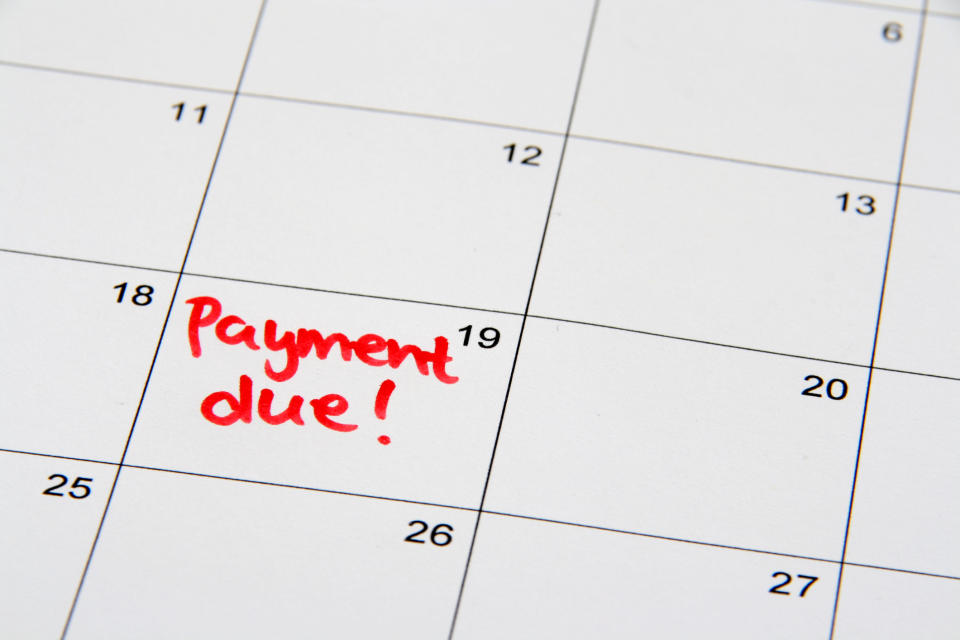5 Things You Need to Know About Late Credit Card Payment Fees in 2019

Image source: Getty Images.
If there’s only one piece of credit card advice you follow, it should be this: Make on-time payments.
When you miss a required monthly payment, the credit card company will charge you a predetermined late fee. Each credit card has its own late fee policy, and the fees can start to add up if you are a habitual late payer. It can also destroy your credit.
However, sometimes late payments happen, and it’s important to understand the consequences. Here are the top things you should know about credit card payment late fees this year.
1. They may increase
Each year the Consumer Financial Protection Bureau (CFPB) adjusts the maximum limit credit card companies can charge for late fees -- and it just went up again. The new thresholds allow credit card companies to charge $28 for the first time you are late making a payment and $39 for any following late payments. This is a $1 increase from the previous fee caps. It’s ultimately up to the credit card company to decide if they will increase their late fees, but they are typically in line with the CFPB maximums.
2. They can be applied even when your payment is a minute late
Your credit card company specifies both a date and a time (often 5 p.m., perhaps later for online payments) for when your payment is due. Your credit card payment is considered late the second you pass the specified time on your payment due date. This means credit card companies can exact a late fee as soon as that happens, and they often do.
Even with the best intentions, you can still incur an accidental late fee. Keep in mind that there are often delays involved in making a credit card payment. If you submit your payment right before the deadline, it might not process in time and will still be considered late.
Times zones can also have an effect on payment processing. Remember, the deadline is based on the credit card company’s time zone, not yours. So, give yourself a cushion and plan to make your payment in advance of the due date.
3. They can also be applied if you make partial payments
When it comes to credit card companies, partial payment is not full payment. Even if you pay your bill on time, you can still incur a late fee if you aren’t making the full minimum payment required. If you are having issues meeting the minimum payment, reach out to your credit card company immediately to make arrangements so you can avoid paying unnecessary fees or taking a hit to your credit.
4. You’ll still have thirty days before it affects your credit
If you do miss a payment, it won’t hit your credit report until it is considered 30 days late. It will then be updated every 30 days until your account is 180 days delinquent, and getting a late payment removed from your credit report is not easy. Any negative mark on your credit report can stay for seven years, so you don’t want to neglect a missed payment. The most important thing to do when you miss a payment is to make the payment and address any associated fees as soon as possible to minimize the impact on your credit score.
5. New credit cards might stop charging them
For the past several years there’s only been one credit card that doesn’t charge late fees -- a rare feature considering the punitive nature of credit cards. However, more are popping up to appeal to current consumers.
Today’s consumer understands the weight of their purchasing power and can easily shop around for the best credit card for their situation. Unnecessary fees can sway a consumer’s decision, causing them to avoid credit cards altogether -- and credit card companies are beginning to respond. At the end of last year, a new millennial-focused credit card was launched that serves consumers with slim credit histories and charges no fees, including late fees.
The best way to deal with late payment fees is to avoid them altogether by setting yourself up for success. Take advantage of setting up automatic payments, so you never accidentally miss a credit card payment. You can choose to automatically make the minimum payment or to pay a specific amount each month to help pay down your balance faster.
The Motley Fool owns and recommends MasterCard and Visa, and recommends American Express. We’re firm believers in the Golden Rule. If we wouldn’t recommend an offer to a close family member, we wouldn’t recommend it on The Ascent either. Our number one goal is helping people find the best offers to improve their finances. That is why editorial opinions are ours alone and have not been previously reviewed, approved, or endorsed by included advertisers. Editorial content from The Ascent is separate from The Motley Fool editorial content and is created by a different analyst team.

 Yahoo Finance
Yahoo Finance 